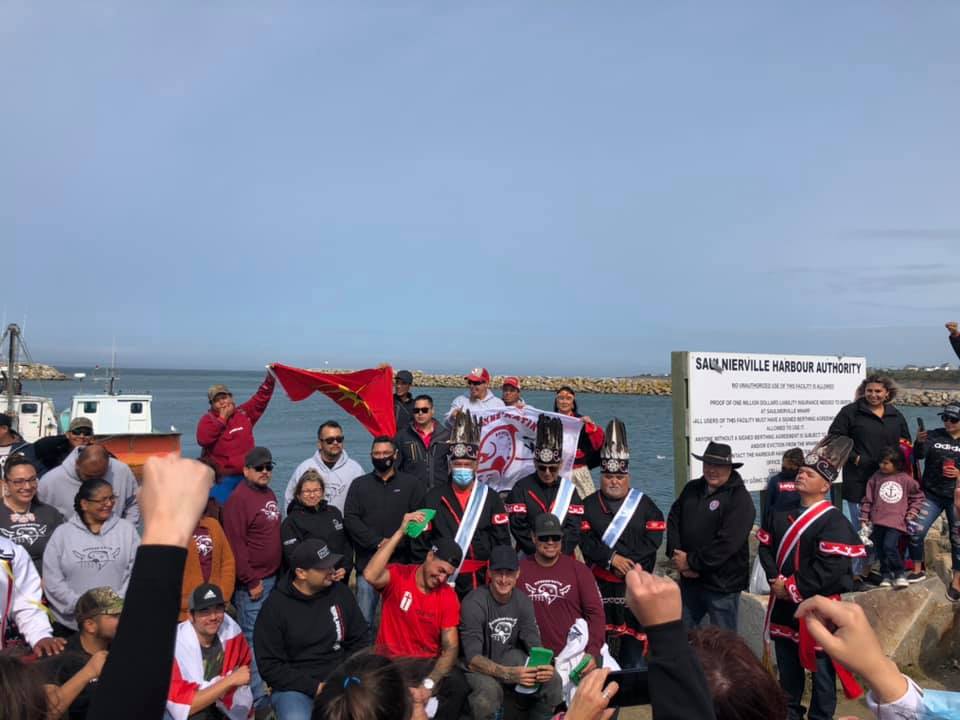Thursday, September 17, the Sipekne’katik First Nation gathered in Saulnierville, Nova Scotia, to celebrate the opening of the first Mi’kmaq Moderate Livelihood fishery. This action came on the 21st anniversary of the 1999 Supreme Court ruling of R. v. Marshall, in which the 1760 and 1761 Peace and Friendship Treaty rights were upheld.
This ruling was a landmark case for the fishing and hunting rights of the Mi’kmaq, Wolastoqiyik, and Passamaquoddy peoples, who signed the Peace and Friendship treaties with the British Crown in the 1700s. It established that these nations had the right to fish, hunt, and gather with the intent to make a moderate livelihood.
21 years after this Supreme Court ruling, the Canadian government and the Department of Fisheries and Oceans (DFO) has yet to define a moderate livelihood or fully implement the 1999 decision. Years of unproductive negotiation with DFO have led the Sipekne’katik First Nations to take it upon themselves to move forward with implementing fishing towards a moderate livelihood.
This celebration and application of their rights, however, was met with racist backlash and terrorism from non-Indigenous commercial fishers. The situation escalated to the point where the Assembly of Nova Scotia Mi’kmaw Chiefs declared a state of emergency on September 18 in response.
Around 60-70 non-Indigenous commercial fishing boats showed up near the Saulnierville wharf to protest the Mi’kmaq fishery. They antagonized Mi’kmaw fishers, cut trap lines, shot flares at Mi’kmaw boats, and stole or damaged up to tens of thousands of dollars worth of fishing gear. Some places in the surrounding communities even refused to serve or sell to Indigenous people.
Hundreds of Indigenous people gathered at the Saulnierville wharf to support the Mi’kmaw fishers, including around 20 fishing boats. Justice Gruben, an Inuvialuit and Wolastoqiyik student at StFX university, was one of many Indigenous youth who went to show his support.
“It was empowering,” Gruben said of the experience. “There’s this beauty of gathering, where we can come together to feel heard and protected and supported.”
He also spoke about how the fishery is not a conservation issue.
“We have teachings, sacred teachings, built into our fishing practices,” Gruben explained, using “notching the tail” as an example. This practice helps identify female lobsters who produce eggs and sees them returned to the ocean.
“They’re claiming a conservation issue, when it’s commercial fishers who can make 200 to 300 thousand dollars in a season while Mi’kmaw fishers generally make 30 thousand to 50 thousand,” Gruben explained.
The licenses issued by the Moderate Livelihood fishery allow for 50 traps each, with seven licenses available to make a total of 350 traps. Only three are currently being used. This is compared to the 390 thousand traps allowed by the commercial fishery in the area.
The tensions calmed some as the events gained media traction over the past two weeks, with various MLAs, MPs, and government officials speaking out in support of the Mi’kmaw fishery. Discussions between the Assembly of Nova Scotia Mi’kmaw Chiefs and the Canadian government have begun over the exact regulations of the Moderate Livelihood fishery.
Minister of Fisheries, Bernadette Jordan and Minister of Crown-Indigenous relations, Carolyn Bennett, met with the Mi’kmaw chiefs on September 21. The main issue now relates to how Mi’kmaw fishers can sell their catches, as selling out of season is prohibited by the DFO and could be met with further backlash. .
The events of the past two weeks, however, have also reignited conversations around treaty rights, anti-Indigenous racism and colonialism, lack of support from the RCMP, and media coverage of Indigenous issues.
When asked about next steps, Gruben said, “we need the full implementation of our treaty rights,” and that people should remember, “we are all Treaty people”.
People can show their support by writing to their government representatives, educating themselves on the treaties they are covered under, and donating to the Mi’kmaw fishers to help them replace their stolen and damaged gear.
The Sipekne’katik First Nation put out a press release asking for donations to be sent to monicah@sipeknekatik.ca through e-transfer or PayPal.
You can fill out a quick email template to have an email asking for support of the fishery sent to your MLAs and MPs here:
You can check out the short documentary about the fishery, All Eyes on Mi’kma’ki, on YouTube: https://www.youtube.com/watch?v=k7u7aKTyUZU
For an Indigenous perspective, or more information, you can check out the Aboriginal Peoples Television Network’s coverage of the Moderate Livelihood fishery story at: https://www.aptnnews.ca/tag/nova-scotia/.




